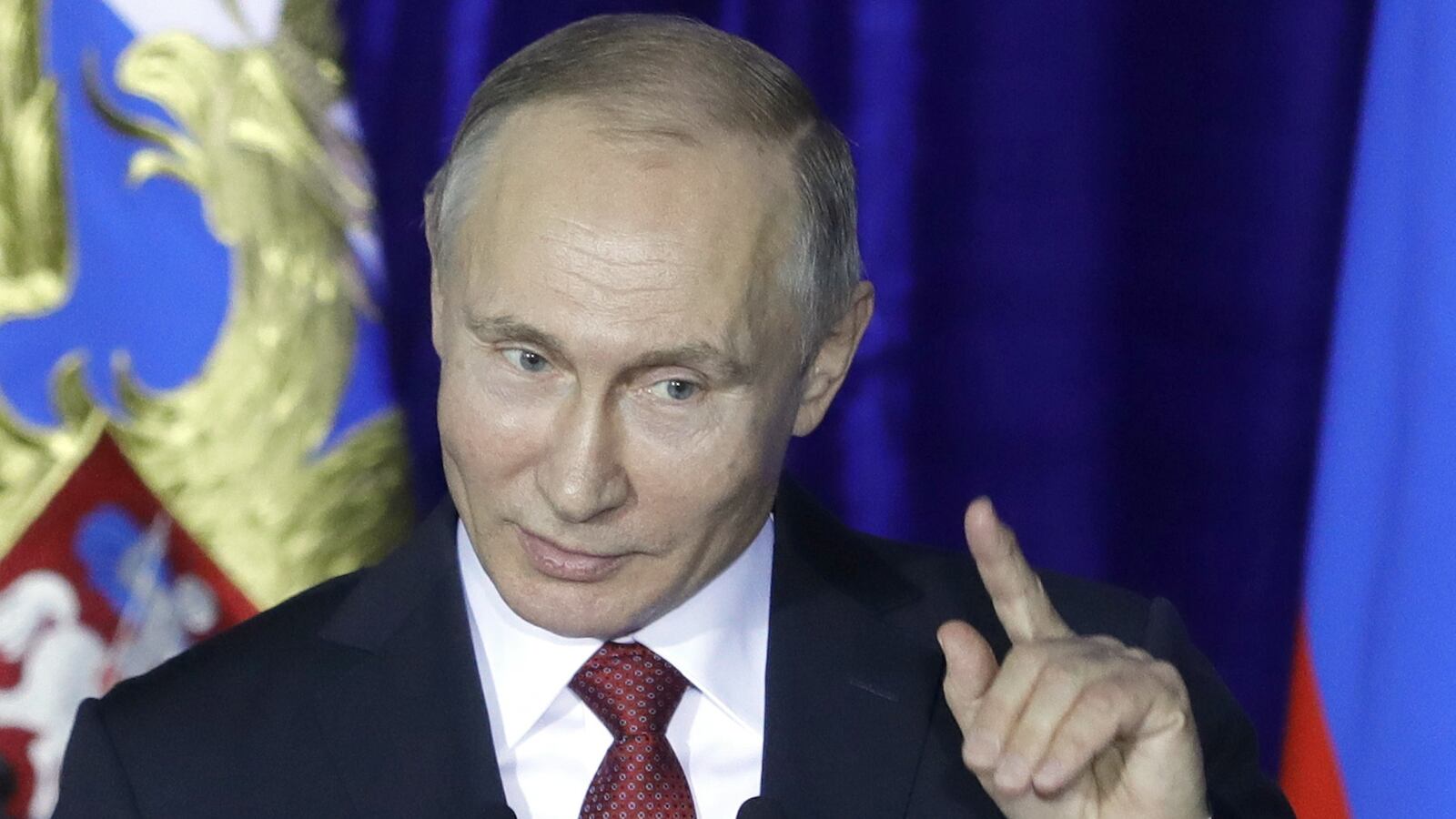Why did it take a full week for Russian authorities to reveal the brutal murder, on Jan. 26, of 53-year-old St. Petersburg political activist Konstantin Sinitsyn? To give it a little time before shock waves emerged?
In fact, there were few shock waves, even among Russia’s community of democratic oppositionists, because Sinitsyn’s murder was just another in a growing list of violent attacks against members of that community that have occurred in the past several months, with the March presidential elections approaching.
As Russian journalist Iulia Latynina observed Sunday on the radio station Ekho Moskvy, “the statistics are bad.”
Latynina herself was forced to flee Russia last autumn in fear for her life. The violence against her, accompanied by death threats, began in the summer of 2016, when an unidentified assailant threw human feces on her as she walked down a Moscow street.
Then the attacks escalated.
Her car was set on fire in an apparent assassination attempt last July, and poisonous gas was later funneled into her home.
Latynina is now safely in exile abroad, but Sinitsyn, a “citizen journalist,” who often photographed protest movements led by anti-Putin crusader Aleksei Navalny and reported about them on social media, was not so lucky.
He was bludgeoned to death at the entrance to his apartment by a man named Vasilev, now in custody, during what police claimed was a personal dispute with Sinitsyn that was fueled by alcohol. (The two reportedly worked together.)
Was it only a coincidence that the killing occurred just two days before the Jan. 28 street demonstrations in St. Petersburg and elsewhere that were called for by Navalny to advocate for a boycott of the March presidential elections? And also a coincidence that, on the day of the protests, another opposition activist, Dinar Idrisov, was beaten almost to death by three unknown assailants as he was about to video the St. Petersburg boycott actions?
A month earlier, Vladimir Ivanyutenko, a St. Petersburg member of the opposition group Artpodgotovka, who often appeared at protests wearing a Putin mask, was stabbed several times in the throat and barely survived. And Vladimir Shipitsin, an activist with the group Solidarity, which sponsored several protests against the Kremlin’s aggression in Ukraine, was gassed and then beaten at the entrance to his St. Petersburg home in late October, as his assailant warned him: “Stop writing [this…] about good people. Next time it will be worse for you.”
Russian authorities have not identified the attackers in any of these three cases. And such actions are not limited to St. Petersburg. Moscow also has had its share of violence against Kremlin critics recently.
In October, democratic oppositionist Aleksei Stroganov died after two months in a coma from an assault with a steel pipe. Before that Ivan Skripnichenko, a volunteer guard at the memorial on Bolshoi Moskvoretskii bridge for slain democrat Boris Nemtsov, was beaten at his post by thugs in mid-August and died in the hospital a week later.
The police response to these attacks and the subsequent investigations follow a predictable pattern. Either the assailants are never identified, or when they are caught, they are said to have had a personal, not a political, motive. Thus, when Ekho Moskvy deputy editor Tatyana Felgenhauer was stabbed in the throat in her office last October, the perpetrator, a Russian-Israeli citizen named Boris Grits, was arrested immediately. And in the wink of an eye, police announced that Grits was mentally unbalanced and motivated by a personal obsession with Felgenhauer.
But the authorities did not explain why Grits had a map of Ekho Moskvy’s office building or how he knew that Felgenhauer was there at that time, when she was not scheduled to work. As the station’s editor in chief, Aleksei Venediktov, observed of Grits: “He knew things he shouldn’t have known.”
It is worth noting that Felgenhauer was on the Kremlin’s enemy list. The month before, on the state-owned television channel Rossiya-24, she was accused of receiving money from the U.S. State Department and Western NGOs.
The goal of this violence is to eliminate some oppositionists and intimidate others. Putin’s fierce critic Nemtsov had his life threatened on numerous occasions, but refused to leave Russia. So he was brazenly gunned down in February 2015 on a bridge just outside the Kremlin walls. His 33-year-old daughter, Zhanna, an active supporter of her father’s campaign against Putin, chose to emigrate rather than become another victim, and now lives in Germany.
As Latynina points out, “regardless of who are the perpetrators of these murders… it is clear that these crimes are sanctioned by the regime because they are not investigated. At first they stopped investigating assaults. Now they have stopped investigating murders.”
As for the scant attention the recent spate of murders and attempted murders has drawn: “They are passing unnoticed because our ‘schizo democrats’ have long known that the regime is bloody and that it kills. It blew up the [apartment] houses [in 1999]; it killed [Sergei] Yushenkov [a liberal politician]; it crashed the plane of the Polish president, killed [Anna] Politkovskaya and so on.”
Like Nemtsov, Navalny refuses to be intimidated, despite having been almost blinded in one eye last spring when he was doused by a stranger with a caustic substance, and despite having been roughed up by the police on many occasions, including on Jan. 28, when he was arrested and thrown into a paddy wagon. (He was later released but was called in for questioning Monday on the outlandish charge of assaulting a policeman, while a video of his arrest shows just the opposite.) Several members of Navalny’s campaign staff also were detained during the demonstrations, along with hundreds of protesters.
Asked in an interview with CNN on Jan. 27 about fears for his safety, Navalny said: “I am a rational person… I ran my election campaign for 12 months and I spent two in prison, so I have a clear understanding of what this regime can do. But I am not afraid and I am not going to give up. I won’t give up on my country. I won’t give up on my civil rights. I won’t give up on uniting those around me who believe in my ideals.” Unbeknownst to Navalny, one of those who shared his ideals, Konstantin Sinitsyn, had just been murdered.
Navalny claims that, although his name has been banned from the presidential ballot, Putin is terribly afraid of the challenges he poses to Putin’s regime. Judging from the escalating violence against his supporters, Navalny is probably right. As Putin famously said of his enemies in his autobiography, “If you become jittery, they will think they are stronger… You must hit first, and hit so hard that your opponent will not rise to his feet.”





